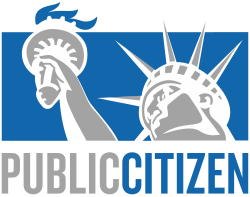Public Citizen
This article relies too much on references to primary sources. (May 2021) |
 | |
 Public Citizen's headquarters in Washington, D.C. | |
| Founded | 1971 by Ralph Nader in the US |
|---|---|
| Type | Think tank |
| Focus | Consumer advocacy |
| Location |
|
Area served | Nationwide (US) |
| Method | Research, lobbying, litigation and appeals, media attention, direct-appeal campaigns |
Key people | Robert Weissman (President) Mark A. Chavez (Foundation Chair) Jason Adkins (Inc. Chair) Joan Claybrook (emeritus President) |
Revenue (2019) | $17,885,184[1] |
| Website | www |
Public Citizen is a non-profit, progressive[2] consumer rights advocacy group and think tank based in Washington, D.C., United States, with a branch in Austin, Texas.
Lobbying efforts[]
Public Citizen advocates before all three branches of the United States federal government.[3] Its five divisions include: Congress Watch; Energy; Global Trade Watch; the Health Research Group;[3] and Public Citizen Litigation Group, a nationally prominent public interest law firm founded by Alan Morrison and known for its Supreme Court and appellate practice.[4]
Broadly speaking, Public Citizen favors robust corporate accountability and strong government regulation, particularly in the areas of transport, healthcare, and nuclear power. The organization's priorities range from campaign finance reform to drug and auto safety and financial reform. The unifying theme is an effort to curb the impact of corporate power on American democracy.[3]
For example, Public Citizen has been a public voice on matters related to drug policy and pricing, exemplified by advocacy surrounding Gilead Sciences and remdesivir, and the potentially cheaper alternative GS-441524.[5]
Organization and history[]
Founded by Ralph Nader in 1971,[6] Public Citizen is funded by dues and contributions from its members and supporters, foundation grants, and publication sales and does not accept government or corporate funds.[3][7]
Disassociation from Ralph Nader[]
In the aftermath of Ralph Nader's 2000 presidential campaign, Public Citizen disassociated itself from its founder. Progressive magazine Mother Jones wrote about the so-called "rank-and-file liberals” who faulted Nader's U.S. presidential run in 2000 for taking votes away from Al Gore, thus ensuring George W. Bush’s victory. Mother Jones also pointed out that Nader’s association with Public Citizen was causing fundraising problems. Mother Jones cited a letter by Public Citizen to its readership with the disclaimer: "Although Ralph Nader was our founder, he has not held an official position in the organization since 1980 and does not serve on the board. Public Citizen—and the other groups that Mr. Nader founded—act independently."[8]
People associated with Public Citizen[]
- Ralph Nader, founder
- Joan Claybrook, first Executive Director
- Former U.S. Representative Donna Edwards
- Robert Weissman, Executive Director
- Mark J. Green
- Lori Wallach, Director, Global Trade Watch
- Sidney M. Wolfe, Director, Health Research Group
- Phil Radford, Former Organizer, Global Trade Watch; currently democracy, clean energy and environmental leader
- Wenonah Hauter, Executive Director, Food and Water Watch
- Lisa Gilbert, Congress Watch Director
See also[]
- Consumer Project on Technology
- Food & Water Watch
- Anti-nuclear movement in the United States
- Tasimelteon
References[]
- ^ "2019 Year in Review" (PDF) (Annual report). Public Citizen. Retrieved 16 June 2021.
- ^ Hulse, Carl (September 30, 2014). "Support Strong for Regulating Politics and Nonprofits". New York Times. nytimes.com. Retrieved 2017-09-21.
- ^ Jump up to: a b c d About Public Citizen
- ^ "Courting Change: The Story of the Public Citizen Litigation Group Archived 2018-06-13 at the Wayback Machine". Public Citizen. citizen.org. Retrieved 2017-09-21.
- ^ https://www.citizen.org/news/public-citizen-scientists-gilead-and-federal-scientists-have-neglected-a-potentially-promising-covid-19-antiviral-drug/
- ^ "Nader Forms Unit to Seek Donations". New York Times. June 2, 1971. p. 16. Retrieved 2017-09-21.
- ^ "Annual Reports and Form 990s". Public Citizen. citizen.org. Retrieved 2017-09-21.
- ^ Margolis, John (July–August 2001). "Nader Unrepentant". Mother Jones. Retrieved 2017-09-21.
External links[]
- Public Citizen
- Dupont Circle
- Government watchdog groups in the United States
- Political advocacy groups in the United States
- Organizations established in 1971
- Ralph Nader
- Progressive organizations in the United States
